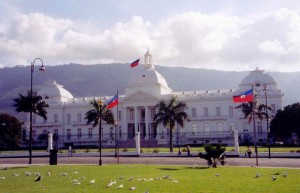#164 – Dick Bernard: Haiti, an Anniversary
Six years ago today – actually it was February 29, 2004, Leap Year – Haiti’s President was loaded on a United States aircraft and removed from Haiti. The United States called it a “resignation” by Jean-Bertrand Aristide. Aristide – who should know – said it was not a resignation. Whatever the case, President Aristide was history, and the six subsequent years have not been kind to Haiti, not the least of which have been the natural disasters visited on Haiti by four hurricanes in 2008, and the earthquake of January 12, 2010.
Whatever problems Aristide and his government supposedly had were not solved by the coup/resignation. Haiti’s continued problems and even acceleration of those problems the last six years have simply been “disappeared” by our government and the media.
In a very sad way, the collapsed Presidential Palace in Port-au-Prince symbolizes Haiti today. Places like the Palace are symbols. Haiti’s symbol is in ruins….
Elections which were supposed to be held in February or March, 2010, have been postponed, and in any event, the major party, Lavalas, which was Aristide’s party, was to have been kept off the ballot due to some technicality or other. Lavalas represented the poor constituency in Haiti. The poor apparently deserve no representation or right to select their own candidates. That is my “spin” of how elections are managed in Haiti..
Two personal insights come to mind this day:
1) In November, 2003, a month before I left for my first trip to Haiti, I was seated next to a Catholic Priest from Port-au-Prince at a dinner in Minneapolis. I knew next to nothing about Haiti at that point, and made the (apparent) mistake of commenting favorably about what I had heard about Aristide. The Priest, who I did not know, “bobbed and weaved” his way out of having to comment. He was very uncomfortable. It struck me as curious, then, but not for long. I entered my experience with Haiti, trusting U.S. Government sources for honest information about Haiti. Within a year I completely lost that trust. I came to find that I was either lied to, or ignored, when I asked questions.
2) Most recently, within the past two weeks, I was at a session where an American survivor of the quake spoke. The speaker had arrived in Port-au-Prince just a few hours before the quake, and a few days later was evacuated from the country. The individual had stayed in the U.S. Embassy prior to departure.
During the session, I asked about that new United States embassy in Port-au-Prince, which is a new structure, and is by all accounts one of the largest U.S. embassies anywhere in the world. It was observed by someone in the audience that photographs of the embassy are all but forbidden around the Embassy; further that while the Embassy was built to withstand earthquakes, and in fact was basically undamaged, everything in the vicinity of the Embassy, outside its walls, had been severely damaged or destroyed in the quake.
It was then I remembered an exercise in frustration during 2004-2006, when I tried to find out where a purported $50 Million in U.S. Aid for Haiti had gone. It was listed in a December, 2003, news release on the U.S. State Department website, and I had simply asked the question “who got the money?” I thought it would be an easy question to answer. But two years and a Freedom of Information Act request later, I had gotten no further than learning that the people who could answer my question were at U.S. AID and Department of Defense. It became very clear that neither one wanted to answer my question, and in the summer of 2006 I finally dropped the quest.
I wondered, sitting in the meeting room a couple of weeks ago, if some of that money – that supposed “Aid” to Haiti – had gone to build that Embassy in Port-au-Prince, that edifice that neatly survived the 2010 quake that killed well over 200,000 of its neighbors.
I don’t know.
Keep seeing Haiti.
RESOURCES: Perhaps the most comprehensive and thoroughly documented book I’ve read on the recent history of Haiti is Peter J. Hallward’s “Damming the Flood: Haiti, Aristide and the Politics of Containment” (Verso, 2007). Another is “Mountains Beyond Mountains”, by Tracy Kidder, the biography of Dr. Paul Farmer, long-time physician to the poor in Haiti and currently Deputy U.N. Envoy to Haiti.
My web reference to Haiti is here.

